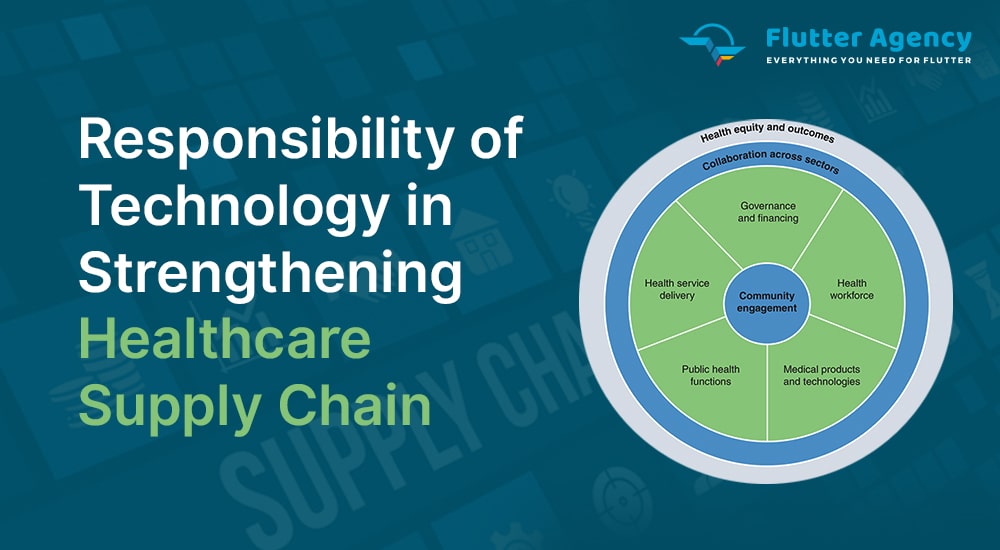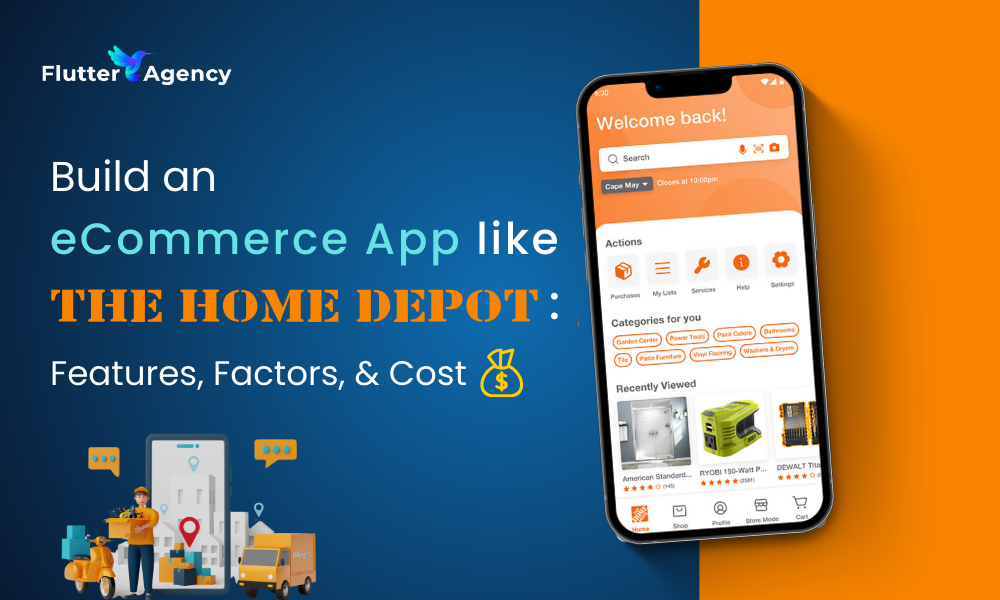What is the responsibility of Technology in strengthening the Healthcare Supply Chain?
Leading executives at medical facilities are considered to restructure their supply chain management for healthcare which is most efficient in terms of operations and cost-effectiveness. It supports improving patient care as hospitals, and health systems will gradually adjust to life after the pandemic.
It can save patient lives by depending on an effective healthcare supply chain. Furthermore, applying technology in the medical field is one step toward progress in healthcare firms.
Hence, it is not surprising that hospitals are utilizing technology more than ever, from electronic health records (EHRs) to patient portals. However, it may be a surprise that each hospital has not completely adopted technology in one field: inventory management referred to as supply chain management (SCM).
Therefore, it makes sense that the supply chain usually charges higher for hospitals and healthcare systems. By automating and standardizing their supply chain procedures with the use of technology, hospitals might save an average of $19.8% or $25 million annually.
Healthcare firms obtain long-lasting advantages from transferring a traditional supply chain to a digital one. Accessibility to everyone is now rapid, secure, convenient, and more affordable healthcare in the form of digital healthcare. By this, a hospital system will save operating costs and classify the growth prospects a lot thanks to the digitization of the healthcare supply chain.
In this blog, we will discuss the different aspects of a healthcare supply chain and describe the importance of adapting technology in creating the traditional healthcare supply chains after it is more efficient. Let us see how the technology supports supply chain development with the steps below, which are integrated successfully.
Define supply chain in the healthcare industry
The production, distribution, and delivery of medications and various healthcare supplies to patients are ensured by the complicated network of systems, elements, and processes which is referred to as the supply chain in the healthcare industry.
However, during the pandemic or natural disaster, this sophisticated worldwide system has been designed with various built-in safeguards to guarantee that medicines and other medical supplies are produced and distributed swiftly.
The capability of the supply chain to anticipate, plan for, and respond to the possible interruptions in one or more chain links over the various pre-established global networks is the utmost of these defenses.
Pharmaceutical quality standard developers, health systems, pharmacies, hospitals, and health insurance providers are some participants in the healthcare supply chain. On the other side, manufacturers and distributors are necessary to the healthcare supply chain.
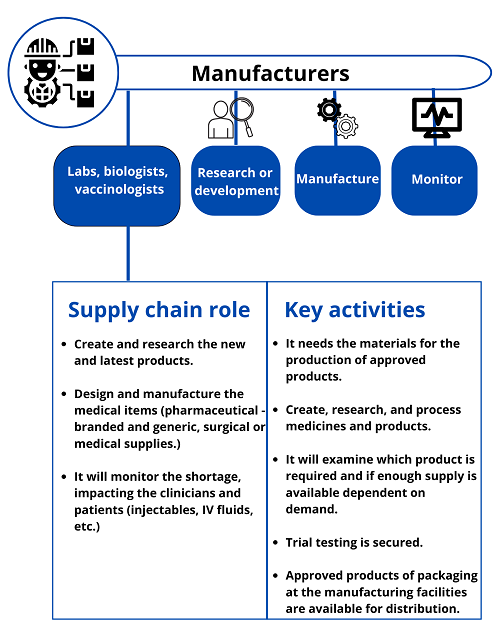
We believe in manufacturers producing the patient medications and medical supplies that form the initial link in the supply chain in hospitals. Manufacturers can control their flow of products from the site of manufacturing to wholesalers, and, in some cases, it is directly to hospitals or pharmacies. The other link is the distributor in the supply chain for healthcare.
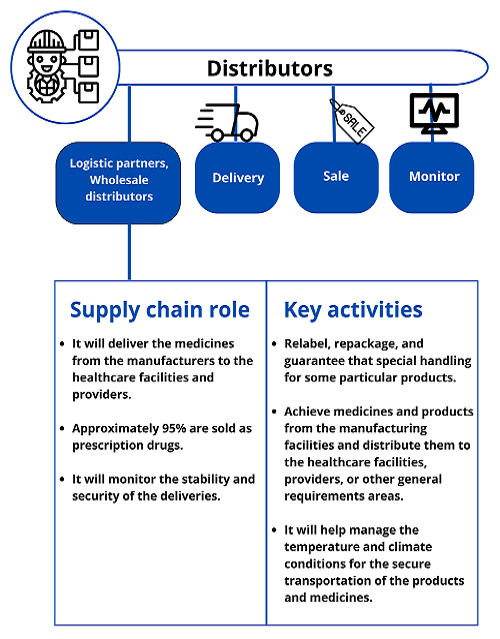
When we think about medical supply distribution, distributors purchase the prescribed medicines and the other healthcare supplies in a very large quantity from manufacturers and correctly manage the heavy inventories in the key sites across the region. A few wholesalers serve some clientele, like nursing homes or a particular product category, like biologics.
What is supply chain management for the healthcare industry?
Supply chain management buys and distributes medical services and goods as they are transferred from the loading port to the patient.
The management of the healthcare supply chain is very complicated. The issues are only exacerbated by improper data reporting, low product uniformity, growing regulatory needs, and the general lack of automation.
While there are so many problems in the supply chain management, the major issues are hoarding of goods, desire for some specific products that are available in stock, product expirations, out-of-stock problems, which will result in high delivery costs, theft, and unjustified increment in the inventory costs dependent on the demand. Many other factors in the supply chain will increase the budget.
Performance of supply management in healthcare
The goal of the supply chain in the healthcare industry is to analyze departmental vulnerabilities and suggest solutions to mitigate them. It will try to pinpoint the problematic areas to obtain the desired health outcomes and boost the financial support for international health.
The main advantage of a better supply chain in the healthcare industry has enhanced operations, content staff, successful treatment, and contented patients.
Healthcare supply management properly integrates hospital departments, revenue cycles, and operations. A supply chain can be considered a backend application required for implementing all various activities.
Supply chain management in hospitals will guarantee that medications and other products are available when required, reduce inventory waste, improve patient care, and coordinate efforts across all the departments to lessen human and pharmaceutical errors.
It is achieved by taking various steps, such as optimizing processes, integrating the digital subsystem, and incorporating technologies to promote supply chain management.
Importance of technology in the healthcare supply chain
Incorporating the cutting-edge, latest technologies into the supply chain management systems, like data analytics, AI(artificial intelligence), IoT, and Blockchain, promotes efficient operations and increases its security and fastest growth in the global healthcare sector.
Marketing of medical app development assumes that the supply chain market will rise from $2.5 billion in 2022 to $3.5 billion by 2025. Developing cloud-based solutions, reducing operating expenses, and increasing efficiency are key drivers that foster this expansion. The common usage of SCM, specifically in the healthcare sector, proves incredibly advantageous for human lives.
How can emerging technologies convert healthcare supply chain solutions?
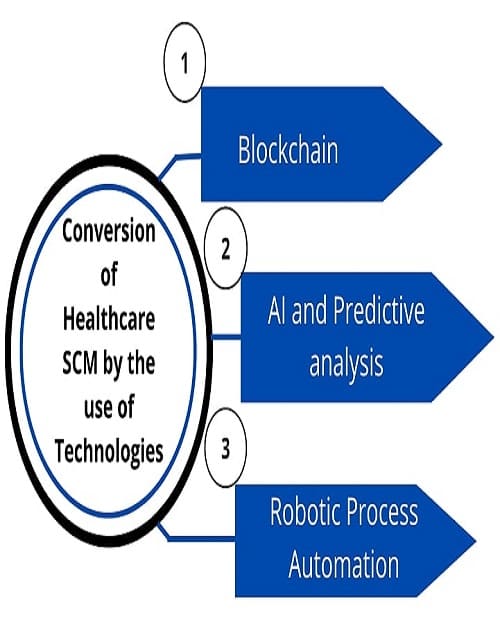
The results could be disastrous or intensely alter a patient’s life if the practitioners run into unexpected shortages while giving the care. Fortunately, technological advancement will lead to a stronger application chain in hospitals that is much more resilient to shocks. Let us see some ways in which some of the most cutting-edge technologies will help us to move towards efficient digital healthcare with robust medical development distribution.
Increase the visibility by utilizing the Blockchain
Blockchain and cryptocurrencies are generally used vice-versa. The digital ledger technology began there; its promise extends beyond that. For example, the Blockchain makes it easier to share knowledge about medical supplies and other vital products that will sustain custom healthcare development.
The most effective procedure for tracking the entire lifecycle of a medicine, down to a single dose, is completely based on blockchain technology. Organizations are developing a complete range of innovative blockchain-based solutions to offer a way of tracking items safely and independently via the entire lifecycle.
Blockchain plays an important role in the supply chain transformation by reducing fraud and enhancing the better-managed quality in producing and distributing pharmaceuticals. Pfizer and Roche are the pharmaceutical corporations developing this type of solution.
Predictive analysis and AI
A mechanism in which data is managed, analyzed, and used across all firms has gone through a fundamental transformation, and it is because of AI. Institutions that use predictive analysis instead of a more fundamental descriptive kind are because of the strides in AI. Pattern monitoring and estimating the possibility of future events are made easier by the use of predictive analytics.
A custom healthcare software development uses predictive analysis to benefit the statistical data and operate the supply chain in hospitals and elsewhere by reducing variance and learning more about demand trends and supply utilization. Accurate forecasting supported by data facilitates the optimization of inventories and assists in better-informed decision-making.
Robotic Process Automation (RPA)
The repetitive, labor-intensive, and manual processes in a healthcare supply chain are removed by adopting an RPA system. It reduces the time and money spent on a supply chain and eliminates the chance that human error will be an issue down the line.
Routine automated tasks will help in improving productivity and lowering the price. Modernizing a warehouse with RPA-deployed services will boost productivity and optimize revenue.
Healthcare supply chain automation
The main purpose of improving the supply chain process software is to streamline and automate the routine manual processes carried out within healthcare development.
Usually, two categories of SCM technology solutions are available to decision-makers in medical app development.
First is Enterprise Resource Planning (ERP), but it doesn’t need to be the only option for hospitals as it is used in many industries, and sometimes the vendors may lack healthcare knowledge.
ERP systems are frequently adopted by the non-healthcare and the largest firms that need a longer time to design and customize resources in their workflow.
A second type is specialty healthcare inventory and supply chain solutions, generally low in price, in-depth industry knowledge, and healthcare-focused solutions. This system intends to focus on specialized fields, like surgery and other healthcare divisions.
Examples of the digital supply chain
Organize the data and manage the flu medication
Using real-time data to predict the seasonal demand for anti-influenza medications provides the hospital with a clear view of where drug doses are in the supply chain. It also confirms that the proper supplies are accessible for the right patient at the correct time and permits the hospital to shift supplies to the most required areas during a shortage.
Increases transparency in inventory
Healthcare software developers and suppliers will enhance visibility over the consignment inventory at the patient’s bedside and transfer the movement of inventories in real time to the areas experiencing shortages by integrating cutting-edge technologies.
Track resources with the Blockchain via the care spectrum
The stability of Blockchain paves the way for product traceability from suppliers of raw materials to manufacturers to consumers to healthcare providers, and it might aid in determining how opioids will end up in the wrong hands.
Supply chain digitization and digital healthcare are the largest trends in the healthcare industry in the future.
How can the Flutter agency support and leverage technology in the healthcare supply chains?
Flutter agency is a reputed Flutter app development organization that effectively implements its project using cutting-edge technology. We offer innovative services like supply chain software development beyond the client’s expectations.
We are the trust-worthy Flutter app development company that provides application development for all sizes of businesses and across all industry verticals. We have experienced healthcare app developers to develop healthcare apps as per project requirements.
We can assist you in healthcare management software development if you are interested in supply chain digitization. You can connect with our Flutter experts.
Conclusion
A correct selection of the technology will help you drastically improve healthcare supply chain management. You have to follow the whole process properly, which will help you to give the desired output.
Frequently Asked Questions (FAQs)
1. How will technology affect the supply chain?
Business process automation, supply chain management innovation, and organizational flexibility are all accelerated factors in the supply chain.
2. State supply chain management in healthcare
It is the one mechanism used for purchasing and distributing medical goods and services as they are transferred from the loading port to the patient.
3. What is the duty of technology in supply chain management?
Due to this, hospital supply chains have become robust and shock-resistant, resulting in technological improvements.
4. What are the features of the healthcare supply chain?
It’s easy to monitor and control the flow of the medical equipment, pharmaceuticals, and healthcare services from producer to the customer and ensure that the patients and the healthcare professionals will receive the prescription drugs and treatments when required.
5. How can the healthcare supply chain be upgraded?
A medical firm enhances the healthcare supply chain by implementing advanced technologies like AI, Blockchain, etc.

Contemporary ventures
Recent blog
ready to get started?
Fill out the form below and we will be in touch soon!
"*" indicates required fields

